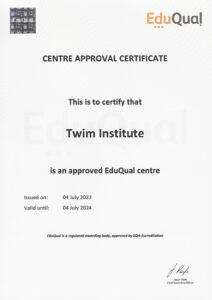If you are reading this post, you are most likely interested in the British diplomas we offer at Twim Institute. You may be considering the diplomas so as to have valid qualifications or perhaps you are looking to ultimately top-up to a degree. Whatever your intentions, there are many possibilities with the British qualifications system, and some of them are explained here.
Let’s start by establishing that countries have frameworks in place to guide their issuance, understanding, and acceptability of qualifications. This can be very important especially because the most known formal methods of academic education may not be suitable for everyone and many people opt for more hands-on vocational models of education. In order, therefore, to understand access these qualifications, frameworks are developed to classify them. Popular country frameworks include the Australian Qualifications Framework which is used in Australia, the New Zealand Qualifications Framework which is used in New Zealand, and the European Qualifications Framework which is used in the European Union. There are also frameworks that are used in the United Kingdom and we will be looking extensively at these.
The Nigerian Framework
Yes, that’s right! As a former British colony. Nigeria has its own qualifications framework for the vocational sector which is known as the National Vocational Qualifications Framework and it is a modification of the British system in many ways.
Nigeria’s NVQs evaluate National Diplomas and National Innovation Diplomas awarded by Polytechnics and Innovation Enterprise Institutions respectively at Level 4. Other Level 4 qualifications include the Advanced National Business Certificate and the Advanced National Technical Certificate.
Polytechnic Higher National Diplomas (HND) are awarded at Level 5 in Nigeria. University degrees are also awarded at Level 5 under Nigeria’s NVQ framework. Masters and other post graduate degrees are awarded at Level 6.
The British Systems
It should be noted that the United Kingdom is actually a group of nations, each having some degree of independence in running its own affairs. As a result, different frameworks are valid in the UK. They are as follows:
- The Regulated Qualifications Framework (RQF) regulated by Ofqual in England and the Council for the Curriculum, Examinations and Assessment (CCEA) in Northern Ireland;
- The Credit and Qualifications Framework for Wales (CQFW) for all qualifications in Wales regulated by Qualifications Wales;
- The Scottish Credit and Qualifications Framework (SCQF) for all qualifications in Scotland;
- The Frameworks for Higher Education Qualifications of UK degree-awarding Bodies (FHEQ) for qualifications awarded by bodies across the United Kingdom with degree-awarding powers
In simpler terms, if you obtain a qualification from the UK, it would have to be regulated by either Ofqual, Qualifications Wales, SCQF or be an FHEQ (typically university) qualification for it to be “government-backed”.
For the non-degree sector, the most popular regulating body is Ofqual (Office of Qualifications and Examinations Regulation). Ofqual diplomas are in different levels. The following are the ones relevant to undergraduate and post-graduate study:
| Level | Typical Title of Qualification | On the Same Level With: |
| 4 | Level 4 Diploma / HNC / CertHE | First year of undergraduate study |
| 5 | Level 5 Diploma / HND / DipHE | Second year of undergraduate study |
| 6 | Level 6 Diploma / Graduate Diploma | Final year of undergraduate study |
| 7 | Level 7 Diploma | Postgraduate Diploma / Masters degree |
Please note that British universities typically run 3-year degrees and not 4 years as is common in countries like Nigeria. Also, please note that for most qualifications to count in academic circles as comparable to a full year of university-level study, they must be 120 credits or more.
Implications of Getting An Ofqual-Regulated Qualification
The United Kingdom is a global leader for education. It is therefore not surprising that their qualifications are widely accepted. Here are some of the advantages you are likely to have:
- UK Ofqual-regulated diplomas are easily comparable to corresponding frameworks in a good number of countries making them a great choice for employment and integrating into the job markets of different countries.
- If your diploma is 120 credits or more, you will most likely be able to get each level evaluated as a full year of university-level study by evaluation bodies such as WES. This implies that you can gain points for immigration programs like Canada’s Express Entry as well as academic institutions in the United States. Please note that institutions in North America have varying admissions and credit transfer requirements and you should check with them first if you intend to do this.
- You can choose to top-up to a degree instead of taking a level-6 diploma, thanks to a good number of progression agreements between awarding bodies and universities in the UK and several other parts of the world. In many of these cases, you can complete the degree online thereby saving extensively on cost in two ways: first, you do not have to enroll with the university until your final year, and secondly, you do not have to incur the costs of traveling from your country or paying for foreign accommodation, etc.
- This system allows you to work while studying and allows a greater degree of flexibility with your studies.
- If you are a Nigerian, you can skip JAMB UTME!
Are you interested in pursuing British diplomas in Information Technology (IT)? Get in touch with us at Twim Institute today and you will be on your way to earning these qualifications and/or a British degree at a fraction of the cost.





